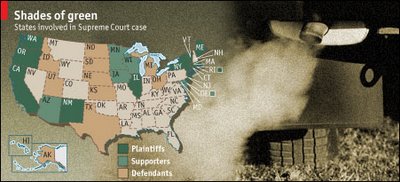America's Battle for the Environment.
However, many Europeans forget that the
What is unique about the American legal system is that states can actually sue the Federal government for its failing policy. This is what is happening with the decision of the Supreme Court to take a case that questions whether the federal government is responsible for regulating vehicle emissions of greenhouse gases under the Clean Air Act in “
The charge is that the EPA is failing its mission by “misreading the Clean Air Act, and ignoring the fact that greenhouse gases endanger public health and welfare”.
In fact, 12 states, three city governments, various activist groups, and American Samoa, a soon-to-be-submerged Pacific territory have issued similar petitions and they are supported by a further six states, two power companies, a ski resort, and assorted clergymen, Indian tribes and others. (The Economist)
As you can see on this picture, many states have passed laws to reduce carbon-dioxide emissions.
.... seven eastern states have formed something called the Regional Greenhouse Gas Initiative, which will treat emissions from power plants in the same way. Almost 400 mayors around the country have signed a non-binding agreement to reduce their cities’ emissions in keeping with the Kyoto Protocol. Many members of the incoming Congress, and several of the leading presidential contenders for 2008, are much keener on emissions caps than Mr Bush. Change, so to speak, is in the air. (The Economist)
The US Supreme Court will probably not give its decision before next spring but during the first hearing yesterday, the Justices seemed divided on the subject along ideological lines.
(with Justices Stephen G. Breyer, Ruth Bader Ginsburg, John Paul Stevens and David H. Souter inclined to find that the plaintiffs had met the standing test while Chief Justice John G. Roberts Jr., along with Justices Antonin Scalia and Samuel A. Alito Jr. were not. So by the end of the argument there appeared a strong likelihood that the court would divide 5 to 4 on the standing question, with Justice Kennedy holding the deciding vote. NYTimes)
This may be a naïve question but why does it always have to so ideological…!
NOTE: by the way, it seems that scientists have fewer doubts than they used to:
The Intergovernmental Panel on Climate Change (IPCC), a body which involves thousands of scientists from over 120 countries who develop detailed reports on climate change, produced a report in 2001 which was reviewed by more than 1,000 top experts, including so-called “climate skeptics” and representatives from industry. The report stated, “There is new and stronger evidence that most of the warming observed over the last 50 years is attributable to human activities.” (via Think Progress)

0 Comments:
Post a Comment
<< Home